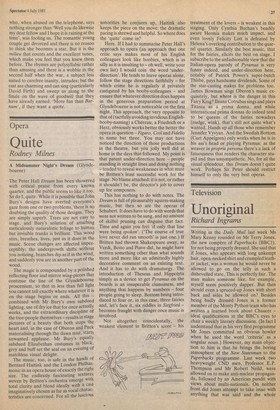Opera
Quite
Rodney Milnes
A Midsummer Night's Dream (Glyndebourne) The Peter Hall Dream has been showered with critical praise from every known quarter, and the public seems to like it too. So do 1, quite. While it is possible that John Bury's designs have averted everyone's gaze from one or two problems, there is no doubting the quality of those designs. They are simply superb. Trees are not easy to stage, and Bury's solution of attaching meticulously naturalistic foliage to human but invisible trunks is brilliant. This wood stirs, breathes, lives, just as it does in the music. Scene changes are affected imperceptibly: the undergrowth shifts without you noticing, branches dip as if in the wind, and suddenly you are in another part of the wood.
The magic is compounded by a polished reflecting floor and mirror wing-pieces that continue the line of the Glyndebourne proscenium, so that in less than full light you cannot tell exactly where whatever it is on the stage begins or ends. All this — combined with Mr Bury's own subdued lighting, use of dry ice that for once actually works, and the extraordinary discipline of the tree-people themselves — results in stage pictures of a beauty that both stops the heart and, in the case of Oberon and Puck materialising through the dawn mist, starts unwanted applause. Mr Bury's equally subdued Elizabethan costumes in black, grey and buff set the seal on an evening of matchless visual delight. The music, too, is safe in the hands of Bernard Haitink and the London Philharmonic in an opera house of exactly the right size. The endlessly fascinating textures woven by Britten's orchestra emerge with total clarity and blend ideally with a cast imaginatively chosen as far as vocal characteristics are concerned. For all the luscious sonorities he conjures up, Haitink also keeps the piece on the move: the dramatic pacing is shrewd and helpful. So where does the 'quite' come in?
Here. If I had to summarise Peter Hall's approach to opera (an approach that one critic says makes most of his English colleagues look like boobies, which is as silly as it is insulting to — oh well, write your own list) I would coin the word `underdirection'. He tends to leave operas alone, follow the stage directions faithfully — for which crime he is regularly if privately castigated by his booby-colleagues — and ensure that whatever direction does happen in the generous preparation period at Glyndebourne is not noticeable on the first night. This approach, the very opposite to that of (tactfully avoiding invidious Englishbooby-naming) a Chereau, a Friedrich or a Herz, obviously works better the better the opera in question — Figaro, Cos and Fidelio to name but three. You may not have noticed the direction of those productions in the theatre, but you jolly well did at home in the days that followed. My point is that patent under-direction here — people standing in straight lines and doing nothing — tended to reveal weaknesses in what must be Britten's least successful work for the stage. No blame attached: it is not, or rather it shouldn't be, the director's job to cover up for composers.
This has nothing to do with notes. The Dream is full of pleasurably squirm-making music, but then so are the operas of Schubert. It does have to do with words that were not written to be sung, and no amount of skilful pruning can disguise that fact. Time and again you feel 'if only that line were being spoken'. (`The course of true love never did run smooth' is just one.) If Britten had thrown Shakespeare away, as Verdi, Boito and Piave did, he might have written something other than what sounds more and more like an admittedly highly decorative comment on an existing text. And it has to do with dramaturgy. The introduction of Theseus and Hippolyta simply as a device to get Pyramus on the boards is an insuperable clumsiness, and anything that happens by numbers — four people going to sleep, Bottom being introduced to four or, in this case, three fairies and, let's face it, six riddles in Siegfried — becomes fraught with danger once music is involved.
Not altogether coincidentally, the weakest element in Britten's score — his treatment of the lovers — is weakest in this staging. Only Cynthia Buchan's beadily aware Hermia makes much impact, and even lovely Felicity Lott is defeated by Helena's overlong contribution to the quarrel quartet. Similarly the best music, that for the fairies, elicits the best on stage. I subscribe to the unfashionable view that the Italian-opera parody of Pyramus is very funny indeed, and under-direction here, notably of Patrick Power's super-butch Thisbe, pays handsome dividends. Some of the star-casting makes for problems too. James Bowman sings Oberon's music exquisitely, but where is the danger in this Fairy King? Ileana Cotrubas sings and plays Titania as a prima donna, and while international prima donnas do indeed tend to be queens of the fairies nowadays (nudge, wink), that's still not quite what's wanted. Hands up all those who remember Jennifer Vyvyan. And the Swedish Bottom (Curt Appelgren) only works when he is in his ass's head or playing Pyramus: as the weaver in propria persona there's a lack of fatuousness that renders the character stupid and thus unsympathetic. No, for all the visual splendour, this Dream doesn't quite work. Perhaps Sir Peter should restrict himself to only the very best operas.






































 Previous page
Previous page